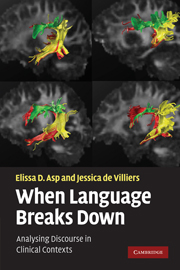Book contents
- Frontmatter
- Contents
- List of figures
- List of tables
- Acknowledgements
- Transcription conventions
- Introduction
- 1 Introduction to clinical discourse analysis
- 2 Theoretical and clinical contexts
- 3 Talk and speech – conversation analysis and intonation in English
- 4 Grammar
- 5 Phase and contexts of culture and situation
- 6 Study design
- 7 Differential diagnosis and monitoring
- 8 Cognitive models, inferencing and affect
- 9 Modelling information across domains
- Closing remarks
- Notes
- Appendix A Some basic grammatical terminology and relations
- Appendix B Inventory of codes
- References
- Author index
- Subject index
6 - Study design
Published online by Cambridge University Press: 05 June 2012
- Frontmatter
- Contents
- List of figures
- List of tables
- Acknowledgements
- Transcription conventions
- Introduction
- 1 Introduction to clinical discourse analysis
- 2 Theoretical and clinical contexts
- 3 Talk and speech – conversation analysis and intonation in English
- 4 Grammar
- 5 Phase and contexts of culture and situation
- 6 Study design
- 7 Differential diagnosis and monitoring
- 8 Cognitive models, inferencing and affect
- 9 Modelling information across domains
- Closing remarks
- Notes
- Appendix A Some basic grammatical terminology and relations
- Appendix B Inventory of codes
- References
- Author index
- Subject index
Summary
Introduction
The abilities to talk, to carry on a conversation, and to tell stories are central to us; they are constitutive acts through which we create, embody and perform our selves. Conversation is ontogenetically prior to narrative, developing in tandem with language: two and three year olds can carry on simple conversations: story telling develops around four years of age, co-incident with the emergence of episodic memory and theory of mind. Because of their centrality in our social and cognitive lives, narrative and conversation tasks are increasingly used in study designs to investigate linguistic, discoursal and cognitive patterns. Narrative and conversation tasks provide naturalistic, ecologically valid data which can be used to identify both positive and negative features in discourse.
In this chapter, we explore narrative and conversation tasks for three commonly investigated areas: linguistic structure, narrative and memory. We outline issues in study design based on the models presented in previous chapters. Linguistic structure is commonly investigated in contexts of language development and in speech disorders and is central in the evaluation of speech performance in educational and clinical settings. We discuss morphology and syntax as two areas of linguistic structure in interaction with information processing load as represented in the conversation of speakers with AD and an ASD in Section 6.2. Narrative occurs universally and is important in our cognitive representation of events (van Dijk and Kintsch 1983; van Dijk 2006).
- Type
- Chapter
- Information
- When Language Breaks DownAnalysing Discourse in Clinical Contexts, pp. 93 - 113Publisher: Cambridge University PressPrint publication year: 2010



